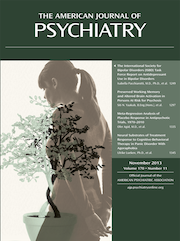Long-Term Effects of Prenatal SSRI Exposure on Child Growth: Weighing the Evidence
To the Editor: We read with interest the article by Wisner et al. (1) evaluating the effect of in utero exposure to selective serotonin reuptake inhibitors (SSRIs) or maternal depression on infant growth in the first year of life. While this study represents an important contribution to the literature, we feel that several issues warrant further clarification to improve interpretation of the results.
First, a previously identified issue relates to the potential for sex-specific differences when investigating long-term outcomes (2). There is strong evidence that prenatal exposure to both SSRIs and maternal depression is associated with a variety of sex-specific outcomes, including postnatal growth (2). We have previously investigated the effect of prenatal SSRI exposure on risk for children who are overweight at 4–5 years old. In this study, we observed that girls of SSRI-exposed mothers were less likely to be overweight compared with girls of mothers with an untreated psychiatric illness (adjusted prevalence ratio, 0.23; 95% confidence interval [CI]=0.05–0.98) and girls of unexposed mothers (adjusted prevalence ratio, 0.27; 95% CI=0.07–0.99). In contrast, no association with being overweight was observed among boys of exposed mothers compared with boys of mothers with an untreated psychiatric illness (adjusted prevalence ratio, 1.17; 95% CI=0.54–2.51) and boys of unexposed mothers (adjusted prevalence ratio, 0.93; 95% CI=0.52–1.67) (3). It would be useful to know whether any analyses were undertaken to examine potential interactions between exposure and the child’s sex and if so, if any differences were observed.
Second, much like percentiles are standardized for age and sex, it may be beneficial to assess patterns of growth in childhood by taking into account the relationship between a child’s height and weight (4). It would be useful to know whether the use of weight-for-length or body mass index-for-age-adjusted percentiles were considered and whether any assessments were undertaken using well- defined international cutoffs to examine growth at either extreme.
While studies such as this emphasize the need for looking beyond birth outcomes and considering long-term effects of prenatal exposure on child development and well-being, an often understudied aspect of medication use in pregnancy, addressing the issues outlined above would enable us to more appropriately weigh the evidence.
1 : Does fetal exposure to SSRIs or maternal depression impact infant growth? Am J Psychiatry 2013; 170:485–493Link, Google Scholar
2 : Long term impact of prenatal exposure to SSRIs on growth and body weight in childhood: evidence from animal and human studies. Reprod Toxicol 2012; 34:101–109Crossref, Medline, Google Scholar
3 : Prenatal exposure to selective serotonin reuptake inhibitors and risk of childhood overweight. J Dev Orig Health Dis 2012; 3:253–261Crossref, Medline, Google Scholar
4 : The first months of life: a critical period for development of obesity. Am J Clin Nutr 2008; 87:1587–1589Medline, Google Scholar



